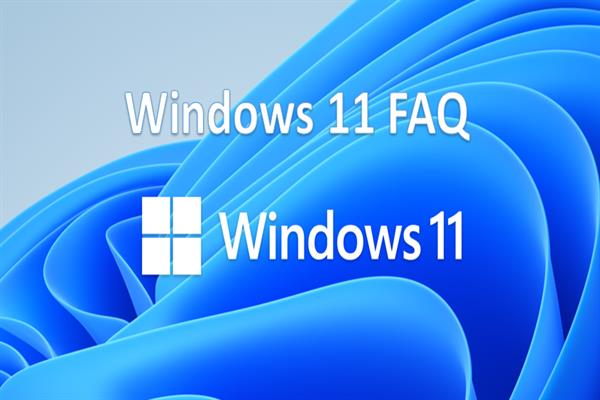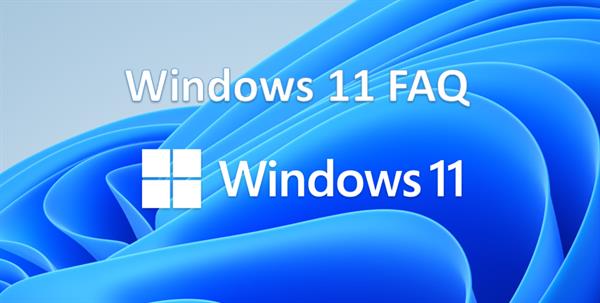Frequently asked questions about Windows 11 | Windows 11 FAQ
Yesterday 24 June 2021, Microsft has launched Windows 11 Officially but Windows 11 isn’t here yet but will be coming later this year (2021). If you’re excited to upgrade your system to Windows 11 you must be having lots of questions in your mind.
In this post, we'll try to give you a quick answer to your FAQs about Windows 11.
Windows 11 FAQ (Frequently asked questions)
Q1. What’s the difference between Windows 10 and Windows 11?
The brand new Windows 11 has all the power and security features of Windows 10 along with new and improved one with a redesigned UI (User Interface) and refreshed UX (User Experience). Windows 11 also comes with new tools, new and improved system sounds and applications. Every detail has been considered. All of it comes together to bring you a refreshing experience on your PC.
Q2. When can I buy a PC that comes with Windows 11 pre-installed?
Hopefully, you'll be able to buy laptops and PCs with Windows 11 pre-installed will be available later this year (2021).
Q3. How much does a PC with Windows 11 cost?
It depends from brand to brand and obviously on the specification you are looking for! Many different manufacturers will offer a variety of devices like Tabs, PCs and laptops that will run Windows 11, all at different price points. May may wait for a good deal or maybe a prime day sale 😜. Just kidding.
Q4. Where can I buy a PC with Windows 11?
PCs that come with Windows 11 pre-installed will be available from a broad selection of retailers later this year. Details to come.
Q5. Will my accessories work with Windows 11?
Yes, If your accessories worked with Windows 10 and meet the Windows 11 requirements, they should work with Windows 11 but If you want to be sure, please check with your accessory manufacturer.
Q6. I want to buy a PC now, will I be able to install Windows 11 later?
Most Windows 10 PCs currently being sold will be able to upgrade to Windows 11. For the PC to be able to upgrade to Windows 11, it must meet the minimum hardware specifications and specific hardware is required for some features. The upgrade rollout plan is still being finalised but is scheduled to begin late in 2021 and continue into 2022. Specific timing will vary by device.
Q7. How do I know if a new Windows 10 PC meets the minimum requirements?
Hmm, there are a few ways to find out. If you’re currently shopping for a new PC look for “Free upgrade to Windows 11" on the fact tag. You can also ask your retail sales professional to confirm that this PC will be able to meet the minimum requirement for Windows 11 or not?
Q8. When will I be able to upgrade to Windows 11 on my Windows 10 device?
If your existing Windows 10 PC is running the most current version of Windows 10 and meets the minimum hardware specifications it will be able to upgrade to Windows 11. The upgrade rollout plan is still being finalised, but for most devices already in use today, we expect it to be ready sometime in early 2022. Not all Windows 10 PCs that are eligible to upgrade to Windows 11 will be offered to upgrade at the same time. To see if your PC is eligible to upgrade, download and run the PC Health Check app. Once the upgrade rollout has started, you can check if it is ready for your device by going to Settings/Windows Updates.
Q9. What are the minimum hardware requirements for Windows 11?
The minimum hardware requirements are available here.
Q10. How do I know if my current Windows 10 PC meets the hardware requirements for Windows 11?
If you’d like to see if your current PC meets the minimum requirements, download and run the PC Health Check app.
Q11. What if my PC doesn’t meet the minimum hardware specifications? Can I stay on Windows 10?
Yes! Windows 10 continues to be a great version of Windows. We have committed to supporting Windows 10 through 14 October 2025.
Q12. How will I know when the upgrade is available for my Windows 10 PC?
Upgrades to Windows 11 will begin to roll out late in 2021 and continue into 2022. During this time, we will be doing some behind-the-scenes testing and validating for your specific PC. Windows Update will provide an indication if and when your PC is eligible. You can check by going to Settings/Windows Update.
Q13. How much does it cost to upgrade from Windows 10 to Windows 11?
It’s free. But only Windows 10 PCs that are running the most current version of Windows 10 and meet the minimum hardware specifications will be able to upgrade. You can check to see if you have the latest updates for Windows 10 in Settings/Windows Update.
Q14. What is the difference between upgrade and update?
An update can consist of bug and security fixes and new features in a version of Windows. They tend to roll out throughout the year. An upgrade is when you change versions—for example, moving from Windows 10 to Windows 11, or moving editions from Windows Home to Windows Pro.
Q15. How long will the free upgrade offer last?
The free upgrade offer does not have a specific end date for eligible systems. However, Microsoft reserves the right to eventually end support for the free offer. This end date will be no sooner than one year from general availability.
Q16. Can I continue to use Windows 10?
Yes. You do not have to upgrade to Windows 11. We will continue to support Windows 10 until 14 October 2025.
Q17. Does Windows 11 take up more space on my PC than Windows 10?
No. Windows 11 and Windows 10 require approximately the same amount of disk space. During the upgrade process, however, extra space is required. Windows will clean up this extra disk space about 10 days after the upgrade is complete.
Q18. Is Windows 11 a Windows 10 replacement?
Windows 11 is the newest version of Windows. However, we will continue to support Windows 10 until October 2025.
Q19. If I upgrade to Windows 11, what will happen to my files?
By default, all your files and data will transfer. However, we recommend backing up your files before installation. Learn more about OneDrive PC folder Backup.
Q20. Can I go back to Windows 10 after I upgrade if I don’t like Windows 11?
Yes. After you have installed the Windows 11 upgrade, there is a 10-day period where you can move back to Windows 10 while keeping files and data that you brought along with you. After 10 days, you will need to back up your data and do a “clean install" to move back to Windows 10.
Q21. How long does it take to install Windows 11?
Downloading and installing Windows 11 will most likely take longer than a typical Windows 10 feature update. You can use your PC while you’re downloading Windows 11 and then you have the option to schedule the install to happen at a specific time when you aren’t planning on using your PC.
Q22. Can I upgrade my Windows 10 PC to Windows 11 if I’m running S mode?
If your PC meets the minimum hardware specifications, the Windows 10 Home edition in S mode can upgrade to the Windows 11 Home edition in S mode. If your Windows 10 PC is running the Pro edition in S mode, you will need to switch out of S mode to upgrade to Windows 11 Pro. Windows 11 Pro edition is not available in S mode.
Q23. Can a really old PC run Windows 11?
You can use the PC Health Check app to determine if your device is eligible to upgrade to Windows 11. Many PCs that are less than four years old will be able to upgrade to Windows 11. They must be running the most current version of Windows 10 and meet the minimum hardware requirements.
Thank you :)
If you have any other question related to Windows 11 do let us know in the comment section.
This post is inspired by the official post of Windows 11.






